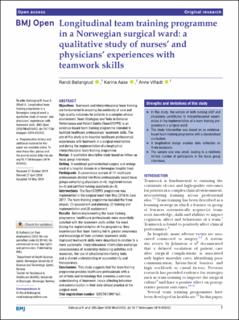| dc.contributor.author | Ballangrud, Randi | |
| dc.contributor.author | Aase, Karina | |
| dc.contributor.author | Vifladt, Anne | |
| dc.date.accessioned | 2021-03-01T11:53:15Z | |
| dc.date.available | 2021-03-01T11:53:15Z | |
| dc.date.created | 2020-07-20T09:56:05Z | |
| dc.date.issued | 2020-05 | |
| dc.identifier.citation | Ballangrud R, Aase K, Vifladt A. (2020) Longitudinal team training programme in a Norwegian surgical ward: a qualitative study of nurses’ and physicians’ experiences with teamwork skills. BMJ Open, 10:e035432. doi:10.1136/ bmjopen-2019-035432 | en_US |
| dc.identifier.issn | 2044-6055 | |
| dc.identifier.uri | https://hdl.handle.net/11250/2730911 | |
| dc.description.abstract | Objectives Teamwork and interprofessional team training are fundamental to ensuring the continuity of care and high-quality outcomes for patients in a complex clinical environment. Team Strategies and Tools to Enhance Performance and Patient Safety (TeamSTEPPS) is an evidence-based team training programme intended to facilitate healthcare professionals’ teamwork skills. The aim of this study is to describe healthcare professionals’ experiences with teamwork in a surgical ward before and during the implementation of a longitudinal interprofessional team training programme.
Design A qualitative descriptive study based on follow-up focus group interviews.
Setting A combined gastrointestinal surgery and urology ward at a hospital division in a Norwegian hospital trust.
Participants A convenience sample of 11 healthcare professionals divided into three professionally based focus groups comprising physicians (n=4), registered nurses (n=4) and certified nursing assistants (n=3).
Interventions The TeamSTEPPS programme was implemented in the surgical ward from May 2016 to June 2017. The team training programme included the three phases: (1) assessment and planning, (2) training and implementation and (3) sustainment.
Results Before implementing the team training programme, healthcare professionals were essentially satisfied with the teamwork skills within the ward. During the implementation of the programme, they experienced that team training led to greater awareness and knowledge of their common teamwork skills. Improved teamwork skills were described in relation to a more systematic interprofessional information exchange, consciousness of leadership-balancing activities and resources, the use of situational monitoring tools and a shared understanding of accountability and transparency.
Conclusions This study suggests that the team training programme provides healthcare professionals with a set of tools and terminology that promotes a common understanding of teamwork, hence affecting behaviour and communication in their daily clinical practice at the surgical ward. | en_US |
| dc.language.iso | eng | en_US |
| dc.publisher | BMJ Publishing Group | en_US |
| dc.rights | Attribution-NonCommercial-NoDerivatives 4.0 Internasjonal | * |
| dc.rights.uri | http://creativecommons.org/licenses/by-nc-nd/4.0/deed.no | * |
| dc.subject | interprofesjonell utdanning | en_US |
| dc.subject | teamarbeid | en_US |
| dc.title | Longitudinal team training programme in a Norwegiab surgical ward: a qualitative study of nurses' and physicians' experiences with teamwork skills | en_US |
| dc.type | Peer reviewed | en_US |
| dc.type | Journal article | en_US |
| dc.description.version | publishedVersion | en_US |
| dc.rights.holder | © Author(s) (or their employer(s)) 2020. | en_US |
| dc.subject.nsi | VDP::Medisinske Fag: 700 | en_US |
| dc.source.volume | 10 | en_US |
| dc.source.journal | BMJ Open | en_US |
| dc.identifier.doi | 10.1136/ bmjopen-2019-035432 | |
| dc.identifier.cristin | 1819824 | |
| cristin.ispublished | true | |
| cristin.fulltext | original | |
| cristin.qualitycode | 1 | |

